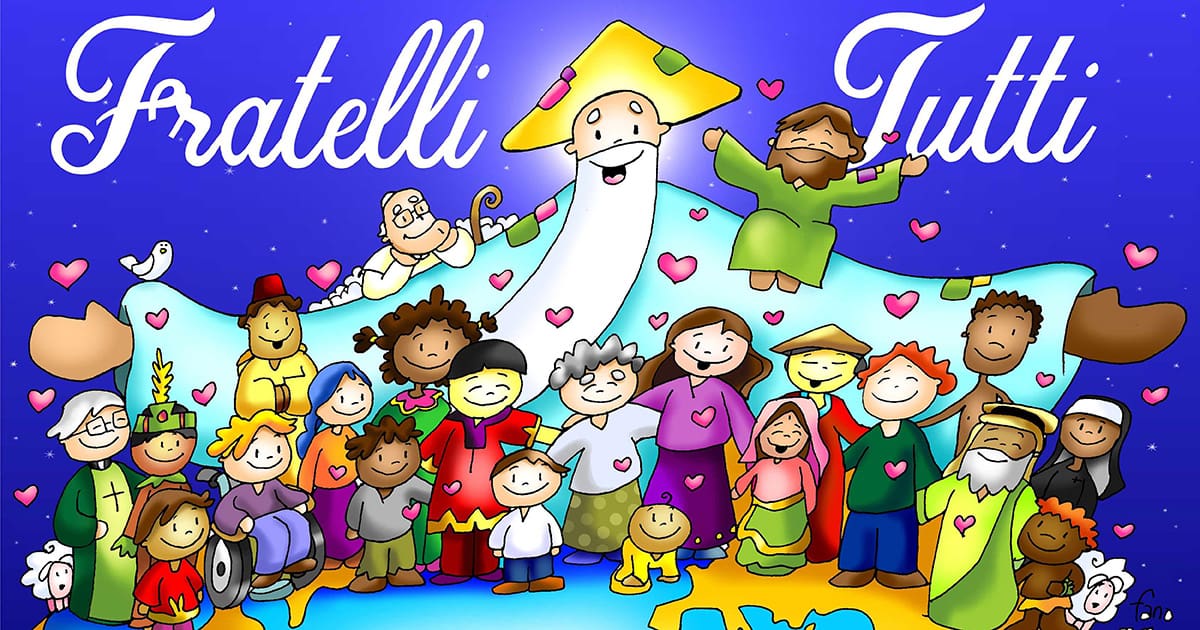Encyclical ‘Fratelli Tutti’: Summary and Commentary (and Part 8)
On the eve of the feast of Saint Francis of Assisi, 4 October 2020, Pope Francis published his third encyclical letter: ‘Fratelli tutti‘.
As the person in charge within an international congregation that fulfils a clear mission in the world, more specifically in the world of education and health care, on the basis of its own charism, Bro. René Stockman offers here a short summary of each chapter followed by a more personal reflection.
Chapter 8: Religions at the service of fraternity in our world
This brings us to the final chapter, which has a topic that Pope Francis holds very dear and in relation to which he has already taken many initiatives. His basic premise is that the various religions should be able to contribute to greater fraternity at world level. The quote from the Indian bishops is quite powerful: “The goal of dialogue is to establish friendship, peace and harmony, and to share spiritual and moral values and experiences in a spirit of truth and love.”
The starting point is that together we should open up to God as the Father of all. We should join together before God as the transcendent truth, which transcends the various religious interpretations. In this way, when we look for God with a sincere heart, we will meet fellow travellers who are also in search of God, without being a priori entrenched in ideological principles. When the world is in crisis today, it is because a kind of anaesthesia for the transcendent has emerged and has made many a master. It has been replaced by purely secular and material interests that have completely supplanted transcendent values. The Church therefore has a public role to play in creating ways of promoting and encouraging human dignity and universal fraternity. Here, the Church shows itself as a mother.
From this standpoint, the Church also wants to esteem the ways in which God works in other religions, in line with what was taught at the Second Vatican Council. At the same time, we must make the music of the Gospel sound in our homes, in our workplaces, in politics, and in the economic world. For it is precisely this constant attention to the dignity of every human being and the building of true fraternity that echoes in the Gospel message.
This is, of course, where the call for tolerance and openness sounds in places where we, as the Catholic Church, are in a minority, and at the same time the Catholic Church wants to show this openness to those who are of a different denomination or who profess a different religion and even to those who do not believe at all. Let us continue to open ourselves to God who does not look with eyes, but with heart, and who is therefore a God of surprises. Ideally, this way we can achieve a harmonious society between different cultures and religions.
That is why any form of religious intolerance is unacceptable, and certainly the terrorism that results from it. Religion can never be the cause of terrorism, but it is mutual poverty, oppression, and injustice that form the basis of it and that abuse religion to commit terrorist acts. That is why religious leaders must do everything in their power to engage in and maintain dialogue with one another, thereby contributing effectively to world peace and suppressing all forms of extremism.
In conclusion, Pope Francis reminds us of those who have truly contributed to building this universal fraternity, both within the Catholic Church and beyond: Saint Francis of Assisi, Martin Luther King, Desmond Tutu, Mahatma Gandhi. And very specifically, Blessed Charles de Foucauld is presented as a model who has travelled a true path of transformation to become a true brother to all men and women. He truly became the ‘universal brother’.
Let us welcome this third encyclical with a thankful heart and honestly look for ways in which we ourselves, as individuals and as a community, can respond even better to the various impelling invitations it carries. Together with the previous social encyclical Laudato Si’, Pope Francis wants to call upon all of us to live up to our mission as Christians, not just indoors, but really as citizens of the world and thus to be salt and leaven in the dough. No one can remain indifferent to the serious ecological problems we are facing, but they must always be placed within a broader framework in the context of the promotion of human dignity: of the whole man and of every man, as Pope Paul VI said. Inspired by God’s Spirit, let us form a living central panel of the triptych in which the two encyclicals are like the side panels, showing us the way, the way of the Gospel, which we must continue to follow radically, but together with many, with all people of good will. Be the change you wish to see in your own environment and in the world.
With an invitation to all to read the whole encyclical, to reread it, to reflect on it together, and to engage in dialogue about it.
Bro. René Stockman,
Superior General of the Brothers of Charity
Source: Brothers of Charity Website
Tags: Fratelli Tutti







0 Comments